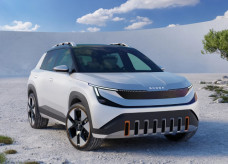Land Rover Discovery HSE vs Toyota Fortuner 2.8 4x2 MT Diesel
- Home ››
- Cars ››
- Car Comparison ››
- Land Rover Discovery HSE vs Toyota Fortuner 2.8 4x2 MT Diesel
Compare Specifications of Discovery HSE and Fortuner 2.8 4x2 MT Diesel
| Selected Cars |  Land Rover Discovery HSE
Brand: Model: |
 Toyota Fortuner 2.8 4x2 MT Diesel
Brand: Model: |
Brand: Model: |
Brand: Model: |
Technical Specifications
| Fuel | -- | Diesel | ||
| Engine Displacement | 2993.00 cc | 2755.00 cc | ||
| Engine | -- | 4-Cylinder, In-Line | ||
| Maximum Power | 183 kW @ 4000 rpm | 177 Ps @ 3400 rpm | ||
| Maximum Torque | 600 Nm @ 2000 rpm | 420 Nm @ 2600 rpm | ||
| Transmission | -- | 6MT with iMT [Intelligent Manual Transmission] | ||
| Top Speed | 180 kmph | -- |
Tyres
| Front | -- | 265/65 R17 | ||
| Rear | -- | 265/65 R17 |
Brakes
| Front | -- | Ventilated Disc | ||
| Rear | -- | Ventilated Disc |
Suspension
| Front | -- | Double Wishbone | ||
| Rear | -- | 4-Link with Coil Spring |
Colors Available
| Colors | -- | -- |
Physical Specs
| Length | 4829 mm | 4795 mm | ||
| Width | 2200 mm | 1855 mm | ||
| Height | 1887 mm | 1835 mm | ||
| Weight | -- | 2610 kg | ||
| Wheelbase | 2885 mm | 2745 mm | ||
| Fuel Tank Capacity | 82.3 litres | 80 litres |
Overview
| Features | -- | SAFETY & SECURITY - ABS with EBD - Speed Auto Lock with Emergency Unlock - Impact Absorbing Structure with Pedestrian Protection Support - Emergency Brake Signal - Anti Theft Alarm with Ultrasonic Sensor and Glass Break Sensor - Front Seats: WIL Concept Seats [Whiplash Injury Lessening] EXTERIOR - Fully Automatic Power Back Door with Height Adjust Memory and Jam Protection - Electrically Adjustable, Retractable Side Mirrors with Side Turn Indicators - Aero-Stabilising Fins on ORVM Base and Rear Combination Lamps INTERIOR - Touch Screen Audio with Capacitive Switches [DVD, BT, USB, Aux-in, 6 Speakers, NAVI, Remote] - Centre Console Box with Soft Armrest - Power Windows: All Windows Auto Up/Down with Jam Protection and Electronic Internal Rear View Mirror - Cooled Upper Glovebox - Power Back Door Access on SMART Key, Back Door and Driver Control OFF ROAD FEATURES - A-TRC [Active Traction Control] - Electronic Drive [2WD/4WD] Control - Approach/Departure Angle: 0.51 rad/0.44 rad - Tough Frame with exceptional Torsional and Bending Rigidity |
Trending New Cars!!!
Electric Cars in India




 Best cars under 25 lakh
Best cars under 25 lakh BYD Seal: The Upcoming Electric Sedan Set to Electrify Indian Roads on March 5
BYD Seal: The Upcoming Electric Sedan Set to Electrify Indian Roads on March 5 Skoda Slavia Style Edition Hits the Market at ₹19.13 Lakh: Only 500 Available
Skoda Slavia Style Edition Hits the Market at ₹19.13 Lakh: Only 500 Available Tata Curvv SUV Set to Launch in Late 2024: A New Challenger for Hyundai Creta?
Tata Curvv SUV Set to Launch in Late 2024: A New Challenger for Hyundai Creta? 2024-2025 Electric Cars Launch in India: Discover the Latest EV Models, Prices, and Range
2024-2025 Electric Cars Launch in India: Discover the Latest EV Models, Prices, and Range Aston Martin Vantage 2025 Unveiled: Power and Style Redefined
Aston Martin Vantage 2025 Unveiled: Power and Style Redefined Tata Unveils New CNG AMT Variants for Tiago and Tigor Starting at Rs. 7.89 Lakh
Tata Unveils New CNG AMT Variants for Tiago and Tigor Starting at Rs. 7.89 Lakh






